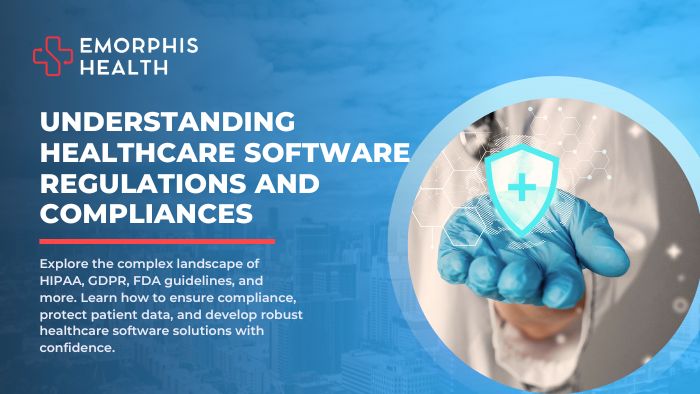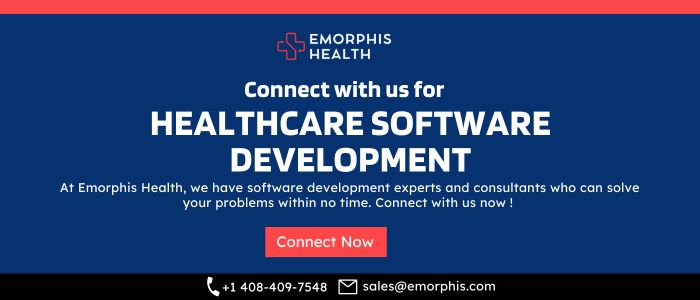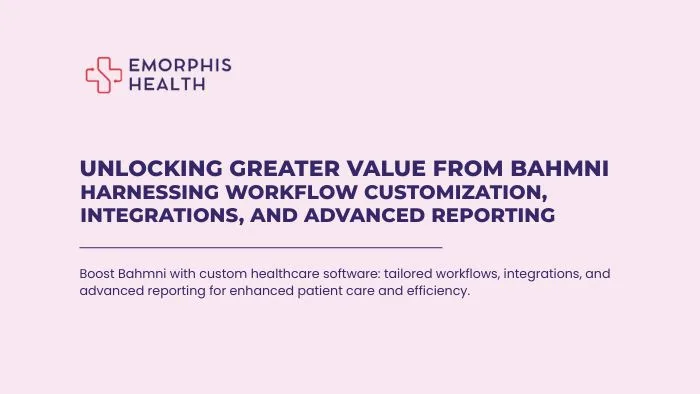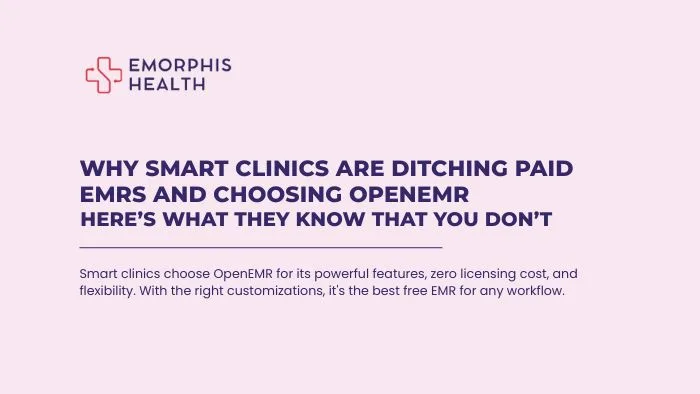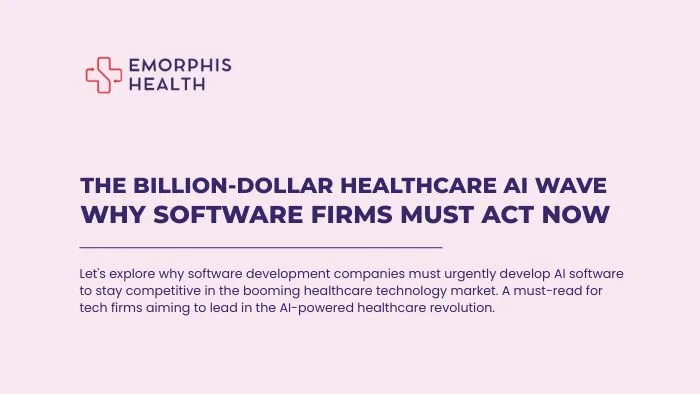An Overview of HIPAA Compliance for Healthcare Software
See Contents
- 1 An Overview of HIPAA Compliance for Healthcare Software
- 2 How Can A Healthcare Software Development Company Become HIPAA-Compliant?
- 3 HIPAA Compliance Rules
- 4 The Impact of GDPR on Healthcare Software Development
- 5 GDPR Awareness
- 6 Ensuring compliance with regulatory bodies during software development
- 7 Why Hire Emorphis as a Healthcare Software Development Company?
Data breach issues have become a big issue for the healthcare organization. A report highlighted that 51 million Americans were impacted by the data breach in 2022. This shows that healthcare organizations have to work hard to protect patient data. To cater to these issues the federal government created a federal law known as HIPAA.
This law makes sure to protect patient data and sets a particular rule for healthcare organizations so that they can protect patient data. Furthermore, the fine for violating HIPAA compliance may range from $100 to $25000. However, the fine depends on the reason for the violation. The Health Insurance Portability and Accountability Act 1996 is a set of standards that protect sensitive patient information.
This healthcare compliance was mainly created to protect the sensitive information of patients, improve efficiency and ensure that patients are notified about any data breach. A healthcare software development company must abide by the rules and ensure that the software is HIPAA compliant. Besides, a company cannot ignore HIPAA as it will be a criminal offense.
The main aim of HIPAA compliance is to safeguard individuals’ rights. So that they can understand how their information is being used by different organizations. All the companies and employees who deal with patient information need to follow HIPAA regulations. It has been identified that healthcare organizations must design policies and procedures to ensure secure storage, exchange, and management of data.
A software development company must also train its employees regarding healthcare compliance and cybersecurity.
How Can A Healthcare Software Development Company Become HIPAA-Compliant?
Healthcare software development companies can take certain actions to become HIPAA compliant. To become HIPAA compliant, you can use these steps mentioned by us.
1. Carry out a security risk assessment
The security rule specified that the covered entities must conduct a risk assessment. The risk analysis will allow the organization to understand the risk tolerance and impact of risk. In addition, risk assessment helps organizations identify the risk factors like technical failures, human error, or natural disasters.
With the help of this analysis, healthcare software development companies can develop effective strategies to deal with security issues. As per HIPAA compliance, the entities must conduct periodic assessments to mitigate the potential risk.
The research specified that approx. 88 percent of data breaches happen due to human error. To save yourself from these security issues you must hire a software development company that designs HIPAA-compliant software.
2. Implement safeguards
Under HIPAA compliance there are mainly three types of safeguards such as administrative safeguards, physical safeguards, and technical safeguards. The right implementation of these safeguards ensures maximum security and protects data most effectively. Let’s have a look at these safeguards:
- Administrative safeguards: The main role of administrative safeguards is to make sure that employees know how to properly store and access the patient’s information. In this step, organizations must make sure to offer proper security training, review privacy policies, and many more.
- Physical safeguard: Physical safeguard refers to the policies, and procedures to protect electronic information systems and other equipment from hazards and unauthorized intrusion. This mainly focuses on restricting physical access to storage areas and monitoring physical devices.
- Technical safeguards: Technical safeguards ensure the protection of the data from unauthorized access. This encourages healthcare software development companies to implement multi-factor authentication, anti-virus software, firewalls, and many more.
3. Activity monitoring
To monitor the activities related to data protection you must appoint a HIPAA compliance officer. The HIPAA compliance officer is responsible for checking whether the security and privacy policies are enforced correctly or not. As per HIPAA compliance the healthcare compliance officer focuses on investigating security incidents, reporting data breaches, conducting periodic risk assessments, and developing a disaster recovery plan.
4. Training for HIPAA
This step makes sure that employees know how to handle personal health information. In addition, they will get to know about the rules and regulations of HIPAA compliance. The rules and regulations of HIPAA may be confusing for new employees. Hence it is important to offer proper training and make your employees understand the importance of security.
5. End-to-End encryption
As per data, 42 percent of global organizations have been using encryption to protect customer information. In addition, encryption is considered a standard way to protect data. Encryption is an effective risk mitigation measure to save you from data breaches. This is an effective way to protect your data as the data can be viewed and accessed by the sender and recipient.
As per our experience, we encourage you to hire a healthcare software development company that follows all the healthcare compliance like HIPAA, FL7, and GDPR. Software development companies must put a major emphasis on security and offer full support at each step.
If you are thinking about developing HIPAA-compliant software or an application, you can get in touch with us.
Let’s have a look at the rules under HIPAA compliance to understand in a better way
HIPAA Compliance Rules
1. Privacy rule
The privacy rule mainly focuses on protecting the personal information of individuals. It sets specific rules for the organizations that use patient information. This rule also gives individuals the right to request a company to get a copy of their record. The main aim of this rule is to protect patients’ information, promote high-quality care, and permit the use of information.
2. Security rule
The HIPAA security rule aims to protect individuals’ electronic health information. This rule ensures individuals that their information is safe from unauthorized access. In addition, this rule also makes sure that the information is not used without the consent of the individuals.
3. Breach notification rule
It is one of the crucial HIPAA rules that describe what entities must do to notify individuals about the breach. This rule also said that companies must notify individuals about the data breach without any delay.
4. Enforcement rule
The enforcement rule includes provisions and related to healthcare compliance, penalties, investigations. This defines the penalties and fines imposed on the violation of certain rules.
It is important to understand that the main aim of these rules is to improve patient experience and protect sensitive information. HIPAA law includes a wide range of policies and procedures for covered entities to enhance data protection.
We suggest healthcare companies must hire an experienced healthcare software development company that can develop HIPAA-compliant software in the most effective manner.
The Impact of GDPR on Healthcare Software Development
Secure software development has become highly important in the current scenario. The data breach cases like Facebook–Cambridge Analytica data scandal have already shown the world how important it is to protect users’ data.
Due to these scandals, laws, and regulations are put in place to protect users’ privacy. If a healthcare Sofware development company collects or stores the data of European users, then the GDPR law applies to it. No matter where you are located you must follow this law.
The general data protection regulation (GDPR) is a privacy law that gives individuals more control over their data. This GDPR law came into effect in May 2018. The GDPR law said that the software development company must design the software which is a GDPR complaint.
In addition, the GDPR law puts major emphasis on documentation and transparency. This means that the companies must show what data they are collecting, and who can access the data. Healthcare software development companies that are dealing with sensitive patient information must take necessary security measures like data backups, firewalls, encryption, and many more. GDPR can have an impact on all software development companies.
Furthermore, you must know how to develop GDPR-compliant software. If a company failed to abide by the GDPR law, then it has to bear a heavy penalty. Regardless of the company size the GDPR law applies to all.
You have to follow certain practices to make sure that the software is a GDPR complaint.
GDPR Awareness
It is necessary to give a detailed overview of GDPR to the software developers. In addition, you should know how it can impact your business. Healthcare compliance with GDPR ensures that data is handled more safely.
The company that designs GDPR-compliant software can save itself from cyberattacks and other serious threats. As a healthcare software development company, you must know the importance of GDPR.
Furthermore, companies can offer GDPR training sessions to give a brief about the law. A software development company that understands the implications of GDPR can design high-quality secure software most effectively.
Before hiring a healthcare software development company, you must conduct thorough research to make the software GDPR compliant.
As a healthcare company, you need high-quality and efficient software to make tasks easier and hassle-free. To do so you need the help of an experienced HIPAA-compliant software development partner. Our team has a huge number of experts that can develop GDPR-compliant software within no time.
If you are thinking about getting GDPR-compliant software, then you can get in touch with us.
1. Proper Documentation
Documentation and transparency are the major aspects of GDPR law. This law makes sure that the company reveals what information they are collecting, its purpose, how long they keep the data, who can access data, and many more.
In addition, the documentation must be a part of the overall software development process. This ensures the maximum safety of the user’s data. It is important to know that GDPR grants individuals various rights, including the right to access, rectify, erase, and restrict the processing of their data.
Healthcare software companies need to provide mechanisms for individuals to exercise these rights easily. By being aware of and complying with GDPR, healthcare software development companies demonstrate a commitment to data protection, privacy, and user rights.
This not only helps them avoid legal consequences but also builds trust with clients, users, and other stakeholders in the healthcare industry.
2. Allow users to manage their data
The GDPR law specified that you could ask the company to give you a clear explanation about the use of your data. You can send them a request to know how they are using your data, the purposes for which it is being processed, and know about any recipients of your data.
You can also understand what data organizations hold about you. This way, you can make informed decisions about how your personal information is being used and exercise your other data protection rights.
Now you have understood that GDPR can help to make the software development process safer and more secure. By designing GDPR-compliant software you can deal with data breach issues and gain the trust of your consumers.
Software development companies must develop, test and deliver software that is GDPR-compliant. This means that they should educate the developers first and check whether the requirements are fully met or not. By following the GDPR you can attain a competitive advantage and enhance user experience.
Ensuring compliance with regulatory bodies during software development
It is important to understand that compliance helps to improve care, reduce risk, reduce cost, improve productivity, and many more. In addition, healthcare compliances require you to follow the rules and regulations set by local, state, and federal authorities.
Infringement to these regulations may cause legal trouble and heavy fines on you. By keeping up with the compliance Companies also prevent the misuse of data and strengthen privacy. To ensure compliance with HIPAA and GDPR healthcare software development companies have to take certain effective measures.
For example, At the time of data exchange the healthcare software development company must use encryption technology, strong authentication measures, and many more. This can help you to save sensitive data from any external threat.
Let’s have a look at some points to understand how a healthcare software development company ensures compliance during software development:
A. Identify the regulations applicable during software development
As a healthcare software development company, you must conduct thorough research to know about the regulations. You must know that different regulations apply to different countries. Hence, your healthcare developers must have an idea about the laws and regulations applicable to that country.
For instance, HIPAA law is applicable in the US, and GDPR is in Europe. If you are making software for US clients, then you must consider HIPAA compliance. The apps or software designed by your developers must be HIPAA compliant.
If you abide by these laws, you can protect the privacy and security of patients, reduce costs, avoid penalties, and increase efficiency. We know that understanding these laws and regulations is a bit of a complex task.
That is why we suggest you hire a healthcare software development company to get all the necessary benefits. A credible and experienced company knows how to make your software HIPAA complaint. They can design software as per your requirements and customize it to fulfill the changing market needs.
B. Perform a regulatory compliance gap analysis
Healthcare organizations must focus on conducting a gap analysis to identify any risks. The main aim of gap analysis is to understand whether the company is moving in the right direction or not. In addition, software developers must also know the importance of achieving healthcare compliance.
This regulatory compliance gap analysis can be considered an effective strategy to manage healthcare compliance. The organizations can also identify what areas need improvement. By conducting a healthcare compliance gap analysis, software development companies can proactively identify and address areas of non-compliance, reducing the risk of legal or financial repercussions.
It is important to note that new laws may be introduced, and existing regulations may be amended or updated. Performing regular compliance gap analyses allows software development companies to stay up to date with the latest requirements and ensure ongoing healthcare compliance.
It helps them adapt their processes, policies, and software solutions to meet the changing regulatory landscape. A gap analysis can be done regularly to make the complaint software or application. In addition, you must hire a company that designs HIPAA-compliant software and addresses all the requirements in the most effective manner.
C. Make sure your developers are aware of country-level healthcare law
The developers working on a particular project must know about the necessary regulations. In addition, developers need to understand these laws to ensure that their applications handle patient data securely and comply with data protection and privacy regulations.
Healthcare laws often emphasize patient rights and require informed consent for data collection and use. Developers need to be aware of these requirements to ensure that their applications obtain appropriate patient consent and respect individual rights.
For example, applications that involve electronic health records or patient portals must adhere to regulations regarding patient access, control, and consent over their health information.
Why Hire Emorphis as a Healthcare Software Development Company?
Healthcare software often deals with sensitive patient information, including medical records, personal details, and financial data. A compliant software development company employs robust security measures to protect this information from unauthorized access, breaches, and cyber threats.
In addition, they follow best practices for data encryption, user authentication, and secure storage, reducing the risk of data leaks and maintaining patient confidentiality.
Emorphis Technologies has a huge number of experienced healthcare software developers that can design high-quality software. In addition, they offer complete support so that you cannot face any issues. If you are looking for a credible and experienced healthcare software development company, then you can connect with us.
We are always ready to develop HIPAA-compliant healthcare software and offer you a competitive advantage within no time.

